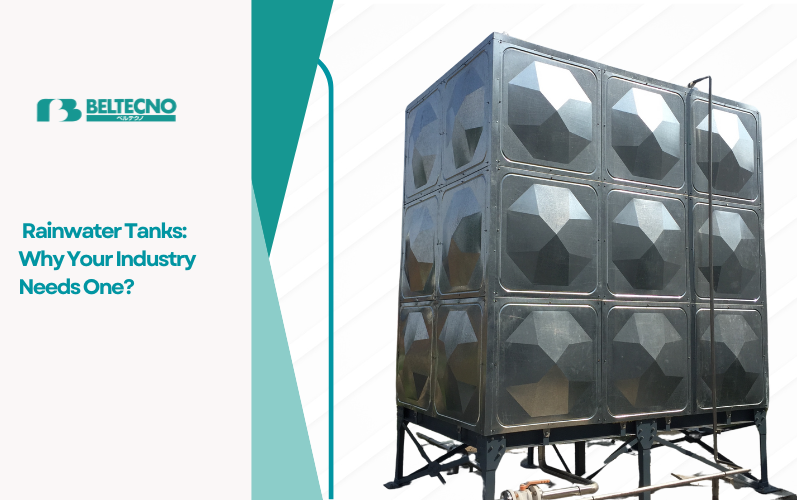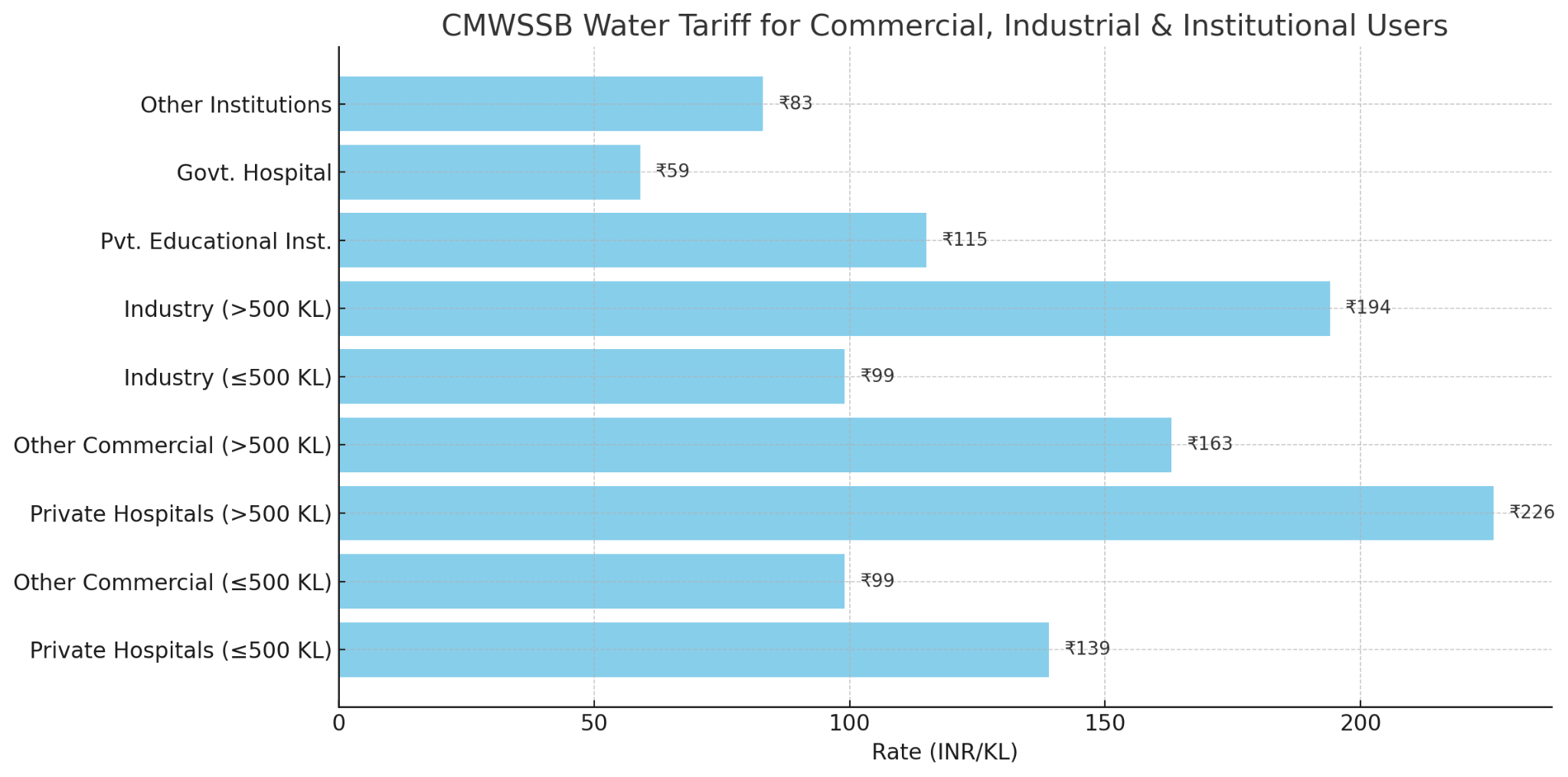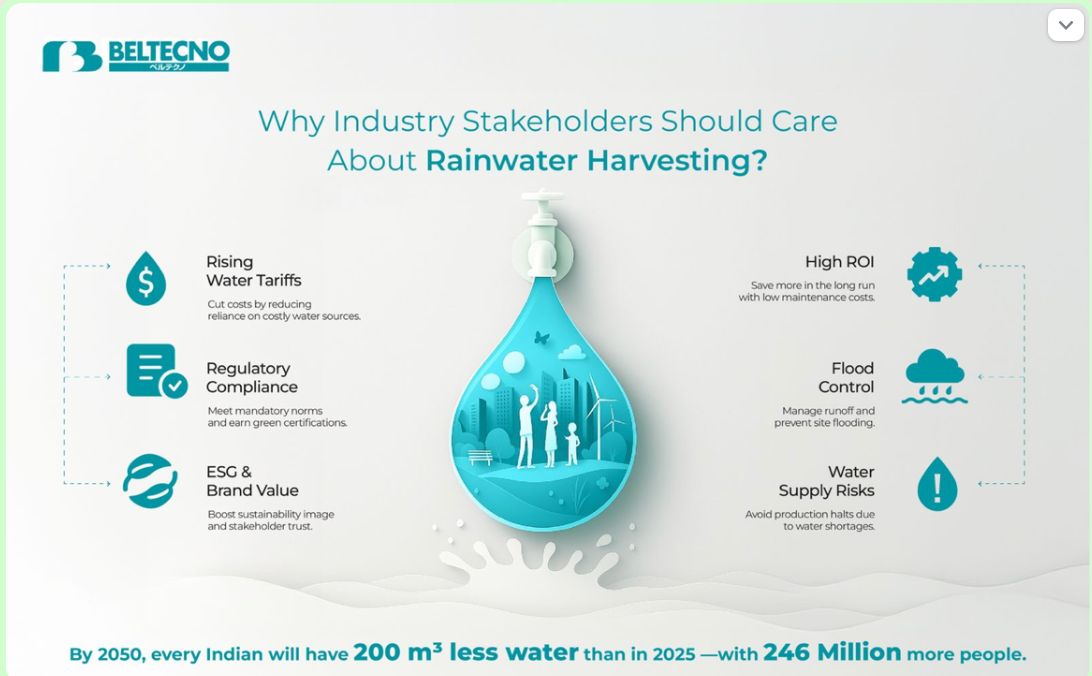Rainwater Tanks: Why Your Industry Needs One?

NITI Aayog’s Composite Water Management Index (CWMI, June 2018) warned that 21 major Indian cities risked groundwater exhaustion by 2020.
And there is no surprise that major cities are facing water scarcity.
Per‑capita water falls from 5,100 m³ in 1951 to 1,486 m³ in 2021, and is projected to drop to 1,341 m³ by 2025 and 1,140 m³ by 2050.
This raises a serious concern about water availability in the near future. So what’s the solution?
How can we make sure that we are prepared for what’s coming shortly?
Well, one of the solutions is water management through Rainwater Harvesting.
But if you are thinking about how rainwater harvesting is for your industry, or why you should care. This blog is a perfect read!
What is Rainwater Harvesting?
Rainwater harvesting is the most widely used method of water management. In short, it is a process of collecting, conveying, filtering, and finally storing it for later use
This water can be reused for recharging groundwater sources or for various industrial processes.
It is a decentralised and sustainable method of water conservation, especially valuable in urban environments facing water stress.
Now, the question is, why should you, as an industry, care about rainwater harvesting? And how can it really benefit your sector?
Why Industry Stakeholders Should Care About Rainwater Harvesting?
Industrial and commercial stakeholders, such as factory owners, real estate developers, hospitality groups, and facility managers, have both economic and regulatory incentives to invest in rainwater harvesting. And here are 6 reasons why:
1. Rising Industrial Water Tariffs

Data Source: CMWSSB
According to the data by CMWSSB, these are the water tariffs as on the type of business. This is the data as per 1 April, 2025, but as the future water demand will rise, these prices will spike up.
Rainwater harvesting lowers your industry’s dependence on municipal supply and can significantly cut operational costs.
2. Mandatory Requirements & Certification Benchmarks
Green building standards like IGBC, GRIHA, and LEED make rainwater harvesting systems mandatory for certification.
Additionally, municipal bylaws (e.g., in Guwahati) now require industrial buildings to implement functional rainwater harvesting systems.
If found non-compliant, industrial buildings can be charged with penalties or have their occupancy certificates revoked.
Rainwater harvesting adoption ensures both regulatory compliance and green certification readiness.
3. Water Supply Instability Threatens Operations
Commercial units in Bengaluru report receiving municipal water once every 3–7 days, making the supply unreliable.
RWH systems serve as a reliable alternate source, securing operations in critical facilities, hospitals, data centres, or manufacturing plants.
4. Boosting ESG & Brand Reputation
Green building certifications requiring RWH not only reduce resource consumption but also support ESG credentials.
IGBC-certified projects are proven to save up to 45,000 kL of water per million sq ft annually.
By enabling green certification and demonstrating water conservation, RWH enhances attractiveness to ESG-conscious investors and lenders.
5. Mitigating Flood and Stormwater Challenges
Industrial parks and large roofs contribute to urban runoff, exacerbating floods. Municipal bylaws now mandate RWH systems to alleviate pressure on drainage infrastructure.
On-site RWH systems reduce surface runoff, enhance urban resilience, and align with municipal flood-prevention norms.
6. Strong ROI with Lifecycle Savings
While a rainwater harvesting setup has moderate upfront costs, increased industrial tariffs and operational expenses make it a smart investment.
Enhanced systems, such as stainless steel tanks, can offer a payback period of 2–5 years and a lifespan of 20+ years, resulting in long-term savings on water bills and pump energy.
RWH delivers lasting economic value, particularly as water prices continue to trend upward.
Rainwater Tanks: More than Just Containers

With the various benefits of rainwater harvesting, it would be valid to say it is an economical and convenient way of water management.
But where to store the rainwater?
And here comes the role of rainwater tanks, these tanks are specially designed to store collected rainwater. Rainwater tanks can be underground, above-ground, small or large as per industrial or commercial needs.
Rainwater tanks are an important part of a rainwater harvesting system. But why should you invest in a good rainwater tank material?
There are various tank materials available in the market, such as plastic, fibreglass, or other traditional materials.
However, common concerns with traditional tank materials are water and tank hygiene.
Here’s a comparative analysis of which is the best tank material: concrete, fibreglass or plastic?
A Comparative Analysis of What is the Best Material for a Rainwater Tank?
| Material |
Lifespan |
Biofilm Risk |
Maintenance |
Water Quality |
Initial Cost |
| Stainless Steel (SS) |
25–30 yrs |
Low |
Low |
Excellent |
High |
| Plastic (HDPE) |
5–10 yrs |
High |
High |
Moderate (possible leaching) |
Low |
| Concrete |
10–15 yrs |
Medium |
Medium |
Varies |
Medium |
| Fiberglass |
10–20 yrs |
Low |
Medium |
Good |
Medium |
Stainless steel water tanks are widely regarded as the most reliable option for rainwater storage. The reason behind this is their superior chemical resistance.
But other than this, there are many other benefits of stainless steel tanks.
Rainwater, while often considered pure, can contain various contaminants depending on atmospheric and environmental conditions.
Unlike plastic or concrete tanks, stainless steel, especially SS304 or SS316L grades, offers high resistance.
Due to its properties, it doesn’t leach harmful substances into the stored water. Its non-porous surface prevents bacterial growth and maintains water purity over long periods.
Moreover, stainless steel's chromium-rich oxide layer gives it a self-healing, corrosion-resistant property. This property can be extremely useful to some extent in the case of acid rain.
Why Choose Beltecno for Rainwater Tanks?
Beltecno India is a trusted SS water tank manufacturer. It is known for delivering high-quality, innovative, and customised stainless steel tanks.
At Beltecno, we know the value of your investment, and that’s why we ensure you get not only the best water tank but also the best customer service.
Our stainless steel tanks are tailor-made according to your needs and can be customised with various features like IoT sensors, temperature sensors, or alarms, etc.
Conclusion
As water shortage issues are making the news headlines, water management has become crucial. And rainwater harvesting is the perfect solution.
It not only benefits your sector economically but also ensures long-term sustainability.
Make the right choice today to ensure a better tomorrow.
Talk to our experts today to find the right rainwater tank for your needs. Contact Us!
